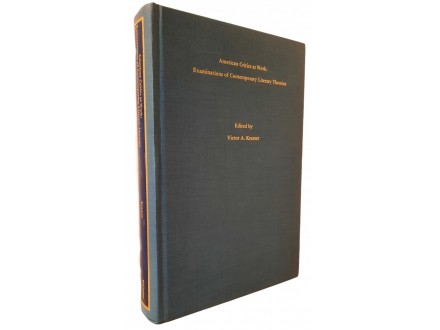EXAMINATION OF CONTEMPORARY LITERARY THEORIES
| Cena: |
1.990 din
(Predmet je prodat)
|
| Stanje: | Polovan bez oštećenja |
| Garancija: | Ne |
| Isporuka: | Pošta Lično preuzimanje |
| Plaćanje: | Tekući račun (pre slanja)
Lično |
| Grad: |
Novi Sad, Novi Sad |
Godina izdanja: 1984
ISBN: 978-0-87875-279-X
Jezik: Srpski
Autor: Strani
Vrsta: Teorija književnosti
American Critics at Work: Examinations of Contemporary Literary Theory Hardcover – January 1, 1984, by Victor Kramer (Editor)
Product details
Publisher: Whitston Pub Co Inc (January 1, 1984)
Language: English
Hardcover: 459 pages
Item Weight: 1.95 pounds
Dimensions: 6.5 x 1.25 x 9.5 inches
From the Publisher
`...a valuable anthology of essays that reflect the wide spectrum of critical opinion in American studies today... [It] provides a good survey of contemporary criticism and helps to clarify the relationship of various movements to each other and to literary theory.`--SOUTH ATLANTIC REVIEW
American Critics at Work is a valuable, if unduly limited, collection of seventeen essays on contemporary literary dieory. Seven of the essays originally appeared in a special issue of Studies in the Literary Imagination (1979); the authors have revised these pieces for the present volume, and other essays – some new, some reprinted – have been added. The editor, Victor A. Kramer, contributes a preface and a twenty-five-page introduction in which he surveys die current theoretical scene and draws comparisons and contrasts between the various essays. A number of the essays are excellent. Gerald Graff rebuts antiassertionist and antipropositional views of literary texts, and concludes that in fact literature does `make assertions` and hence functions as a discourse `with something to say`; Charles Altieri presents a difficult but suggestive study of Othello that takes as its point of departure Wallace Stevens`s meditation on `performance and act of mind` in `Of Modern Poetry`; Hershel Parker gives a lively and indeed sometimes scornful account of the ways in which critics — all too often lacking basic textual and bibliographical knowledge — have sought `unity` in badly flawed editions of texts by Twain, Crane, Fitzgerald, and Mailer; and Michael Sprinker comments expertly on the work of Fredric Jameson, particularly as its political challenges unsettle the pieties of academic liberalism. Other essays are not only valuable in their own right, but connect interestingly and informatively with one another. Readers will profit, for example, from Vincent B. Leitch`s helpful overview of deconstruction, William V. Spanos`s exploration of deconstructive misuses and misappropriations of Heidegger, and J. Hillis Miller`s brisk illustration of deconstructive moments in Carlyle, George Eliot, Swinburne, and Hopkins. And they will benefit, too, from the essays on reader-response criticism by Norman N. Holland, David Bleich, Michael Steig, and Steven Mailloux. Another strength of this volume is its attention to modern and contemporary thinkers whose writings eider have been underestimated or underanalyzed. Here I especially have in mind Nathan A. Scott`s exploration of Santayana`s `poetics of belie P; Matei Calinescu`s inquiry into the `aesthetic attitudes` of Mircea Eliade; and Giles Gunn`s scrutiny of the `semiotics of culture` articulated by Clifford Geertz. These essays help to remind us of the range of writers and texts that contemporary theory embraces, and they very much sustain Kramer`s emphasis on the `plurality` and `diversity` of current criticism. Oddly, however, American Critics at Work as a whole is not diverse or pluralistic. To be sure, Kramer has covered much territory in the essays he has 338Philosophy and Literature gathered, and no reader can fairly expect an editor to supply examples of all methods and approaches. But it is nevertheless dismaying to notice that all of Kramer`s contributors are male, and that none of them even mentions feminist criticism and theory. Nor is there any treatment whatsoever of Michel Foucault. Kramer says in the first sentence of his introduction that he chose essays from the `areas of contemporary criticism and theory which seem of most value for today`s student,` but the obvious gaps make his claim sound quite peculiar. One could legitimately contend that feminism, with its integration of literary studies and politics, and Foucault`s enterprise, with its historical breadth and theoretical sophistication, are precisely the `areas` that are `of most value,` and that they ought definitely to be represented even if other `areas` have to be left out. Kramer himself professes a concern for `as wide a variety of background and approach as possible,` and he warns us about die dangers of `our apparent cultural forgetfulness.` And it is thus his own phrases that mark the shortcomings of the book he has edited.
MG87
Predmet: 70117469











